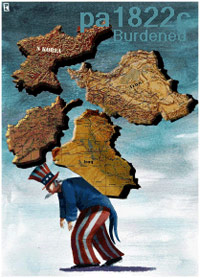
|
 |
 |
 Business News | January 2005 Business News | January 2005  
This Can't Go On Forever - So It Won't
 The Guardian U.K. The Guardian U.K.

The beginning of each year is high season for economic forecasters. With few exceptions, Wall Street economists try to give as upbeat an interpretation as the data will allow: gloom-and-doom forecasts do little to sell stocks. But even the salesmen are predicting a weaker American economy in 2005 than in 2004.

 The biggest global economic uncertainty is the price of oil. Oil producers failed to anticipate the growth of demand in China. Supply side problems in the Middle East (and Nigeria, Russia, and Venezuela) are also playing a role, while George Bush's misadventure in Iraq has brought further instability. The biggest global economic uncertainty is the price of oil. Oil producers failed to anticipate the growth of demand in China. Supply side problems in the Middle East (and Nigeria, Russia, and Venezuela) are also playing a role, while George Bush's misadventure in Iraq has brought further instability.

High oil prices are a drain on America, Europe, Japan, and other oil-importing countries. America's oil-import bill over the past year alone is estimated to have risen by around $75bn. If there were any assurance that prices would remain permanently above even $40 a barrel, alternative energy sources would be developed. But we are now in the worst of all worlds - prices so high that they damage the global economy, but uncertainty so severe that the investments needed to bring prices down are not being made.

Meanwhile, the world's central bankers have been trained to focus exclusively on inflation. Many will recall how oil-price increases in the 1970s fuelled rapid inflation, and will want to show their resolve not to let it happen again. Interest rates will rise, and one economy after another will slow. The march towards higher interest rates has already begun in the U.S. and elsewhere.

For the past three years, falling interest rates have been the engine of growth, as households took on more debt to refinance their mortgages and used some of the savings to consume. Central bankers are hoping that this will not play out in reverse - that higher interest rates will not dampen consumption. Hope may not be enough. House prices could well decline; at the very least, the rate of increase is likely to slow down.

This is only one of the uncertainties facing the U.S. economy. Clearly, some of the growth in 2004 was due to provisions that encouraged investment in that year - when it mattered for U.S. electoral politics - at the expense of 2005. Then there are America's huge fiscal and trade deficits, which jeopardise future American generations' well being, and represent a drag on the current U.S. economy.

As one of my predecessors as chair of the Council of Economic Advisers, Herb Stein, famously put it: "If something can't go on forever, it won't." But no one knows how, or when, it will all end. Indeed, President Bush 's election promises include partial privatisation of social security and making his earlier tax cuts permanent, which, if adopted, will send the deficits soaring to record levels. What, exactly, this will do to business confidence and currency markets is anybody's guess, but it won't be pretty.

As a result, an even weaker dollar is a strong possibility, which will further undermine the European and Japanese economies. Moreover, America's gains will not balance Europe's losses: the uncertainty is bad for investment on both sides of the Atlantic.

Europe, for its part, is finally beginning to recognise the problems with its macro-economic institutions, particularly a stability pact that restricts the use of fiscal policy and a central bank that focuses only on inflation, not on jobs or growth. But there is a good chance that institutional reforms will not come fast enough to lift the economy in 2005.

China - and Asia more generally - represents the bright spot on the horizon. It may be too soon to be sure, but prospects for taming the excessive exuberance of a year ago appear good, bringing economic growth rates to sustainable levels that would be the envy of most other countries.

By contrast, the world's other major economies will probably not begin performing up to potential in the next 12 months. They are all caught between the problems of the present and the mistakes of the past: in Europe, between institutions designed to avoid inflation when the problem is growth and employment; in America, between massive household and government debt and the demands of fiscal and monetary policy; and everywhere, between America's failure to use the world's scarce natural resources wisely and its failure to achieve peace and stability in the Middle East.
| 
 | |
 |



